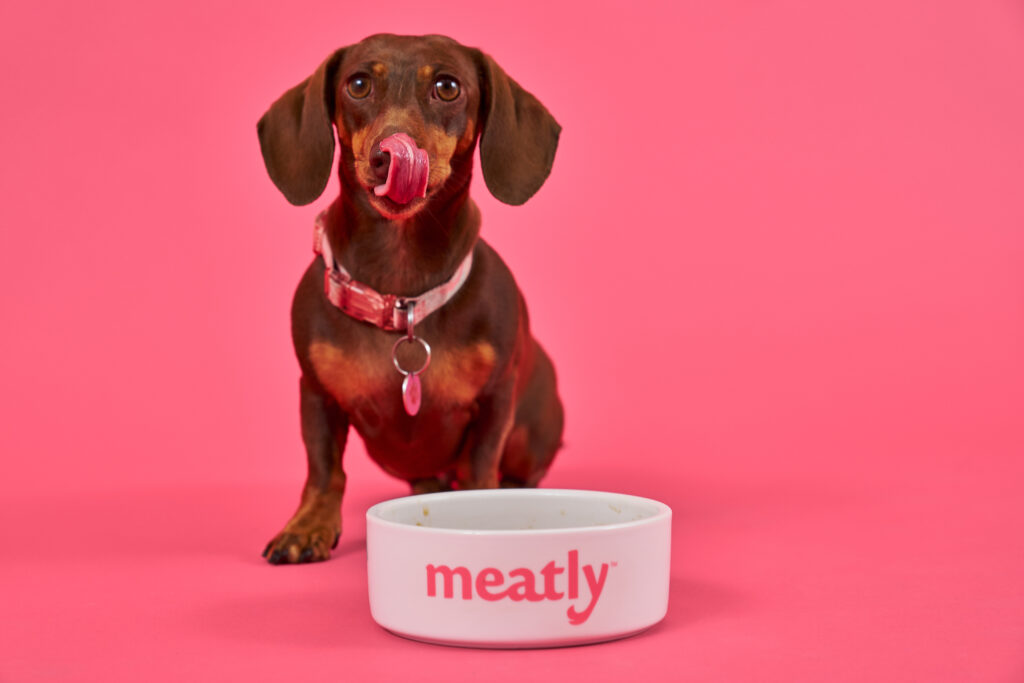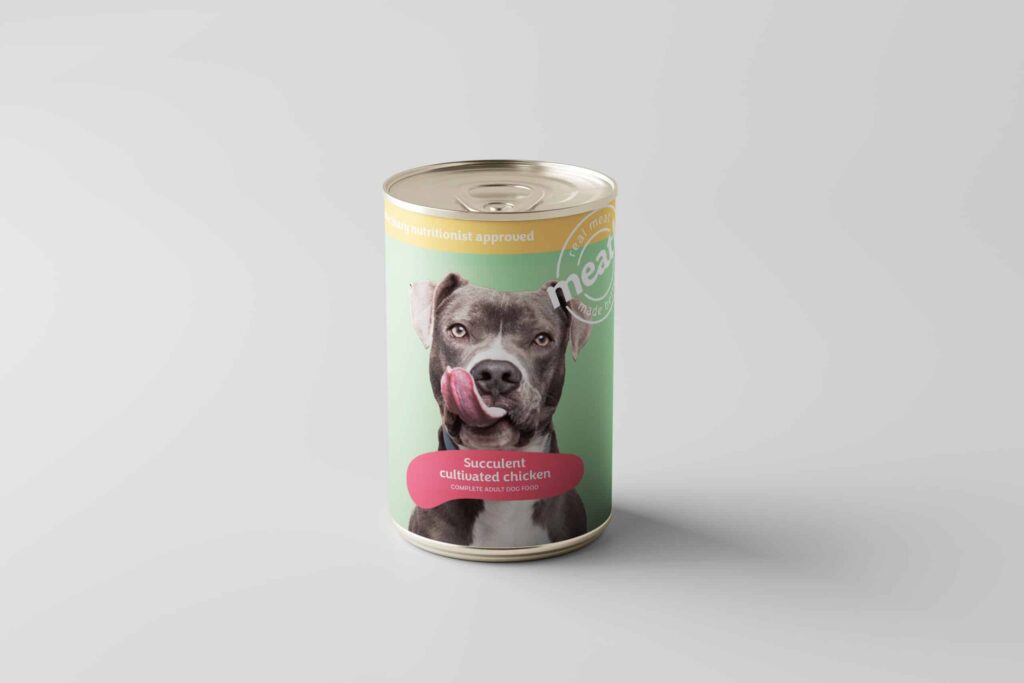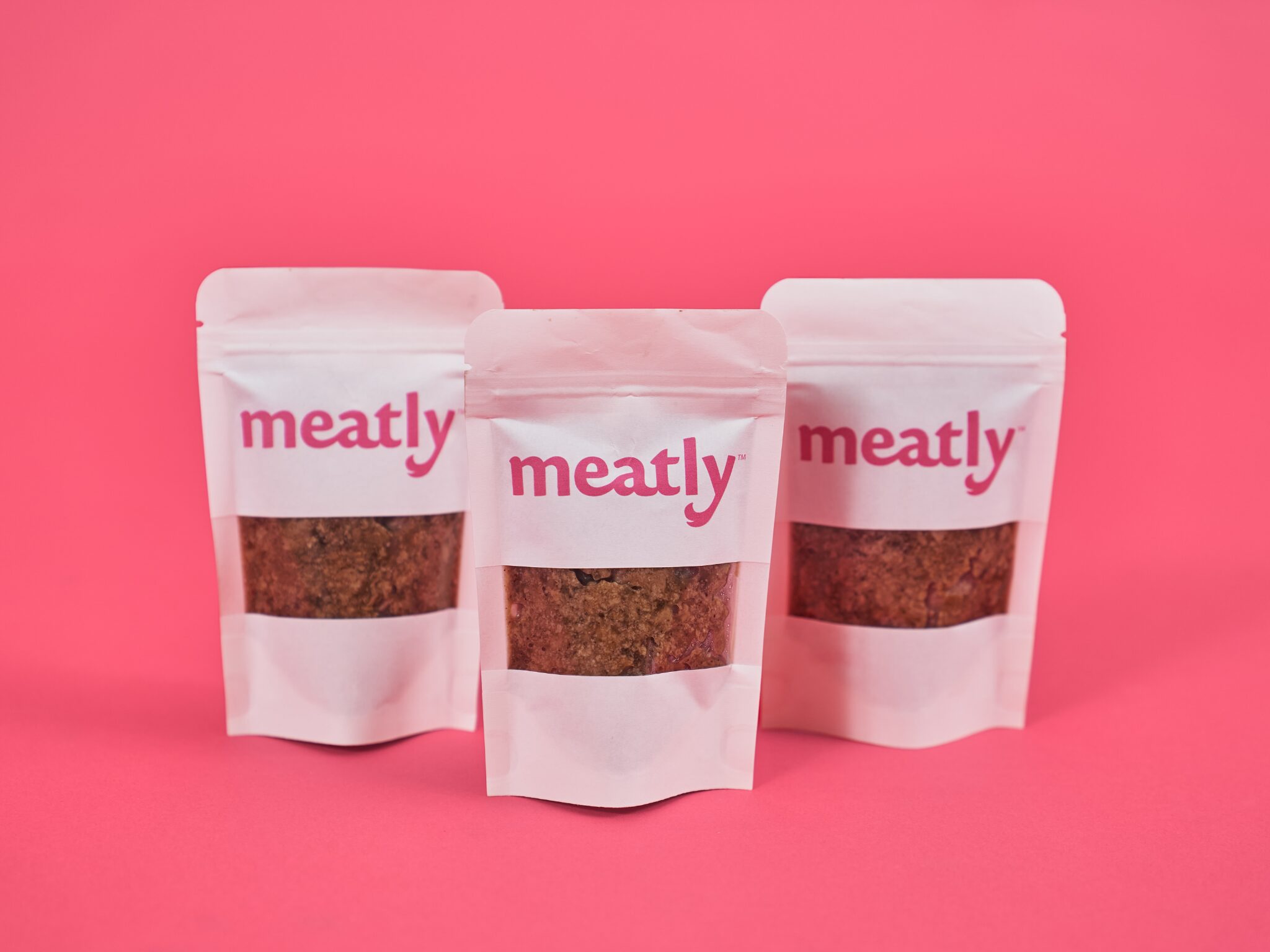With UK Greenlight, Meatly’s Pet Food Becomes First Cultivated Meat to Be Approved in Europe
8 Mins Read
London-based Meatly is now allowed to sell its cultivated meat for pets in the UK, marking Europe’s first approval for these proteins, and the world’s first for pet food.
Meatly has become the first company to be approved to sell cultivated meat in Europe, after UK regulators gave the green light to the startup earlier this month.
Following the decision by the Animal & Plant Health Agency (APHA) on July 2, Meatly can supply its cultivated chicken to dog food manufacturers, marking the first time a cultivated pet food product is cleared for sale anywhere in the world.
It signals the end of Meatly’s 18-month-long consultation process with government bodies in the UK, which joins Singapore, the US and Israel as the fourth country to approve cultivated meat.
The startup plans to launch the first samples of its dog food before the end of the year, beyond which, it will focus on reducing costs. Having secured £3.6M in investment to date, Meatly is now targeting a Series A round, which will help it scale up production to reach industrial volumes in the next three years.
“We’re currently conducting product development and conducting feeding trials on dogs,” Meatly CEO Owen Ensor told Green Queen. “We’re primarily focused on wet pet food for now.”
“Meatly’s regulatory approval is a landmark event for the industry,” said Jim Mellon, founder of Agronomics, an investor in Meatly. “Through its technological innovation and close work with governing authorities, Meatly is helping prove that we can succeed in commercialising cultivated products for pets across the UK.”
“The UK is a world leader in developing cultivated meat and the approval of a cultivated pet food is an important milestone. It underscores the potential for new innovation to help reduce the negative impacts of intensive animal agriculture,” said Linus Pardoe, UK policy manager for alternative protein think tank the Good Food Institute (GFI) Europe.
Meatly to focus on driving down costs

Meatly’s approval comes after assessments from the Food Standards Agency (FSA), the Department for Environment, Food and Rural Affairs (Defra) and the APHA. These government agencies ensured that it complied with all necessary regulations, with the startup’s technology passing the APHA’s rigorous inspection process.
The company has also registered as a feed business operator, and its production facility has been approved by Defra and APHA to produce and handle cultivated chicken.
In addition, it has prepared a comprehensive safety dossier and conducted extensive testing to demonstrate that cultivated chicken is safe and healthy for pets, and contains no GMOs, antibiotics, harmful pathogens, heavy metals and other impurities.
The regulatory approval follows Meatly’s breakthrough in slashing the costs involved with making its cultivated chicken. Culture media, a mix of nutrients that facilitate the growth of animal cells, account for the majority of the production costs. But in May, the startup developed a protein-free version that brought down the price tag from hundreds of pounds to just £1 ($1.25).
“Protein-free media in biopharma is not kind of new, but in cultivated meat is,” Helder Cruz, Meatly’s co-founder and chief scientific officer, told Green Queen in an interview earlier this month. “And it depends also on the type of cells on the species – some are a bit more challenging than others.”
He added that Meatly’s objective had always been to ensure that its processes are “realisable, cost-effective, and food-safe”. The chicken costs in the “double figures” in pounds sterling per kg,
“Currently, we’d price our pet food within the premium market, but we’re aiming to reduce this cost as we scale and develop our product,” Ensor told Green Queen. “One advantage of pet food is that mainstream pet foods are all combinations of meat and other ingredients, so we’re able to further reduce costs here by mixing the meat with other healthy plant-based ingredients.”
First cultivated chicken product will be hybrid meat

While Meatly had previously floated cat food as its first product, it pivoted to dog food in recent months. It has already shipped some of its chicken to pet food manufacturers, who can run their own nutrition tests and try different formulations.
Ensor previously revealed to Green Queen that the company had partnered with “one of the UK’s leading dog food brands” for its first launch. Pressed on this, he said: “We’ll be announcing that after the feeding trials are conducted, but we’re actively working with several leading pet food manufacturers.”
But as he alluded to above, this won’t be 100% cultivated dog food. Instead, Meatly will be taking the hybrid meat approach, which involves combining cultivated cells with plant-based ingredients. This helps keep costs low and makes more sense with its current rate of production.
“What you find typically in pet foods, the meat content… depending on the brand, is typically in that 20-30% window. We’ll probably start slightly lower just because of limited supply,” Ensor has previously explained.
Asked how much of the cultivated meat would make it into the finished products, he said: “The final product will be decided by pet food manufacturers who will sell to. Most pet food on the market are combinations of meat and other plant-based ingredients, to create nutritionally balanced, complete pet food. Products made with Meatly Chicken will be similar.”
Even at lower inclusion rates, the chicken has a great palatability impact, according to the co-founder. “I’ve fed it to my cats several times and they love it! We’re now conducting comprehensive feeding trials on dogs as well and will be sharing the results once complete,” he siad.
One thing is certain: whenever Meatly’s products do come to market, they’ll roll out at Pets At Home, the UK’s leading pet retailer. It invested in the alternative protein startup’s last fundraising round, and represents the “pinnacle” for pet food companies, according to Ensor.
Brits are receptive to cultivated meat for pets

Pet ownership is increasing, but so is the carbon footprint attached to feeding our furry friends. While experts disagree over the true emissions stemming from pet food, one study suggests that 20% of all meat produced is used for pet food.
What is undisputed is that meat is the most carbon-intensive food group on Earth, making up 60% of the food system’s emissions (twice more than what’s generated by plant-based foods). In the UK, pets eat more per year than the entire population under 18, and labradors – the most popular pet dogs in the country – consume 70 million kg of meat annually, nearly 60% more than their owners.
The fact that Meatly is focusing on wet food is crucial, given that wet food can emit up to seven times more CO2e than dry pet food. Meanwhile, growing livestock and their feed take up 85% of the UK’s farmland. Meatly’s cultivated chicken, on the other hand, has been found to use up to 64% less land and 28% less water to produce.
And it seems that both farmers and consumers are becoming warmer to the idea of cultivated meat. Research by the Royal Agricultural University has found that farmers do recognise the potential benefits of these novel foods. And a 2022 study suggested that even if only a third of Brits would try cultivated meat themselves, nearly half (47%) would feed it to their pets.
The main concern that came out of the latter research was nutrition. “We’ve done a lot of nutritional analysis, safety analysis on the product,” Ensor said. “It shows us a very similar nutritional profile to chicken breast and has all of the essential amino acids, fatty acids, minerals and vitamins that cats and dogs need to thrive.”
Third approval for cultivated meat in 2024

Meatly’s approval is a major breakthrough in Europe. For years, the UK has been following the EU’s novel food regulations, even after Brexit. The EU’s complicated framework – partly due to the sheer number of member states – has meant progress on approvals has been non-existent.
The FSA has been attempting to break away from the EU legislation and overhaul the UK’s regulatory process to gain a competitive advantage. Currently, companies face up to 36 months of waiting before they get the go-ahead. But there are concerns that the newly elected Labour government could jeopardise the proposals due to the initial costs involved.
“I think we’re still waiting for a clear perspective from the Labour government. Alternative proteins and biotechnology would seem to fit very well, however, with their push for a sustainable, innovative economy,” said Ensor.
For its part, the FSA said it “welcomes innovations by the animal feed sector” for using alternative proteins like cultivated meat in a safe manner. “The safety of such products, including pet food which is regulated as an animal feed, remains paramount and the FSA closely monitors any new product coming on to the market,” James Cooper, deputy director of food policy at the department, told the Financial Times.
This is the third regulatory approval for cultivated meat globally in 2024. The year began with Israel’s clearance of local cultivated beef producer Aleph Farms, with Australia’s Vow obtaining the go-ahead three months later in Singapore (it is currently under consideration in Australia and New Zealand as well).
Singapore – which was the first country to allow cultivated meat to be sold in 2020 – is also assessing dossiers from Dutch cultivated pork startup Meatly, and French cultivated chicken maker Vital Meat. These followed the US’s clearance of Upside Foods and Good Meat’s cultivated chicken products in June 2023.
Aleph Farms and Vital Meat have also filed applications in the UK, but given that their products are made for human consumption, the process is more complex and time-intensive. “If we’re to realise the full potential benefits of cultivated meat – from enhancing food security to supporting the expansion of regenerative farming – the government must invest in the research and infrastructure needed to make it delicious, affordable and accessible for people across the UK,” said GFI Europe’s Pardoe.
And while some governments – like Italy and the US states of Florida and Alabama – have banned cultivated meat, others have made advancements. South Korea is now accepting applications after developing a framework earlier this year, for example, while India is establishing guidance for approvals as well.



